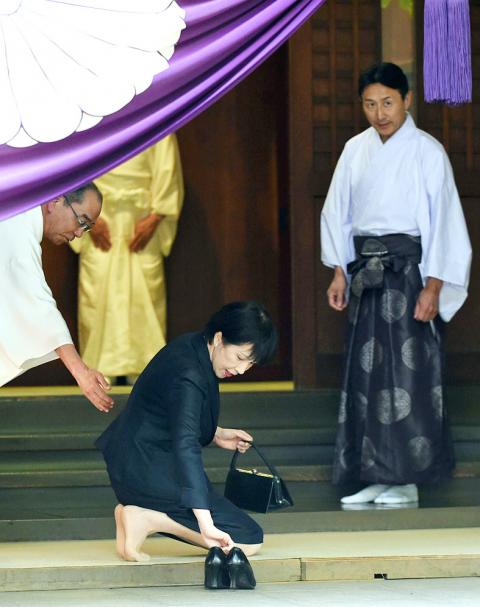Just hours after Japanese Prime Minister Shinzo Abe sat down for his first substantial talks with Chinese President Xi Jinping (習近平), three of his Cabinet ministers yesterday visited the war shrine that Beijing sees as a symbol of Tokyo’s violent past.
Visits by the three have the potential to muddy diplomatic waters that were starting to clear after their nationalist boss sat down with the Chinese president on the sidelines of a regional summit in Jakarta, Indonesia.
“I offered my sincere appreciation for the people who fought and sacrificed their precious lives for the sake of the country,” Japanese National Public Safety Commission Minister Eriko Yamatani told reporters after her pilgrimage.

Photo: AFP
“I pledged efforts for building a peaceful country,” said the minister, known for her strident nationalistic views.
She was followed over the next few hours by Haruko Arimura, state minister in charge of female empowerment, and Japanese Internal Affairs and Communication Minister Sanae Takaichi.
More than 100 Japanese lawmakers went to the shrine on Wednesday to coincide with its spring festival, even as officials were making final arrangements for the Xi-Abe meet.
Abe had asked his ministers not to visit before the talks happened, according to Jiji Press.
Xi and Abe held discussions in Jakarta for about 30 minutes, their first lengthy pow-wow since both men came to the helm of nations that are bitterly at odds over history and current territorial disputes.
Abe later told reporters that they had a “very meaningful summit meeting” and bilateral relations were improving.
In Tokyo yesterday, Japanese Chief Cabinet Secretary Yoshihide Suga, speaking after Yamatani’s pilgrimage, said it should have no bearing on warming China ties.
“I don’t think there will be [any impact]. The visit was made in a personal capacity,” Suga said.
Masaru Ikei, professor emeritus at Keio University and an expert on Japanese diplomatic history, said shrine visits like this were somewhat inevitable, but unlikely to be a disaster.
Taiwan expressed regret yesterday over the visit to the shrine.
Ministry of Foreign Affairs spokeswoman Anna Kao (高安) said the government regrets the visit by more than 100 Japanese lawmakers to the shrine a day earlier.
The shrine honors Imperial Japan’s war dead, including 30,304 Taiwanese. It is seen by many as a symbol of Japan’s wartime militarism.
Noting that this year marks the 70th anniversary of the end of World War II, Kao said the government urged Japanese politicians to look squarely at historical facts and reflect deeply upon themselves.
Kao called on Japan to refrain from actions that could hurt the feelings of the people in neighboring countries, and to develop friendly relations with other countries to promote regional peace and stability.

Taiwan is projected to lose a working-age population of about 6.67 million people in two waves of retirement in the coming years, as the nation confronts accelerating demographic decline and a shortage of younger workers to take their place, the Ministry of the Interior said. Taiwan experienced its largest baby boom between 1958 and 1966, when the population grew by 3.78 million, followed by a second surge of 2.89 million between 1976 and 1982, ministry data showed. In 2023, the first of those baby boom generations — those born in the late 1950s and early 1960s — began to enter retirement, triggering

ECONOMIC BOOST: Should the more than 23 million people eligible for the NT$10,000 handouts spend them the same way as in 2023, GDP could rise 0.5 percent, an official said Universal cash handouts of NT$10,000 (US$330) are to be disbursed late next month at the earliest — including to permanent residents and foreign residents married to Taiwanese — pending legislative approval, the Ministry of Finance said yesterday. The Executive Yuan yesterday approved the Special Act for Strengthening Economic, Social and National Security Resilience in Response to International Circumstances (因應國際情勢強化經濟社會及民生國安韌性特別條例). The NT$550 billion special budget includes NT$236 billion for the cash handouts, plus an additional NT$20 billion set aside as reserve funds, expected to be used to support industries. Handouts might begin one month after the bill is promulgated and would be completed within

The National Development Council (NDC) yesterday unveiled details of new regulations that ease restrictions on foreigners working or living in Taiwan, as part of a bid to attract skilled workers from abroad. The regulations, which could go into effect in the first quarter of next year, stem from amendments to the Act for the Recruitment and Employment of Foreign Professionals (外國專業人才延攬及僱用法) passed by lawmakers on Aug. 29. Students categorized as “overseas compatriots” would be allowed to stay and work in Taiwan in the two years after their graduation without obtaining additional permits, doing away with the evaluation process that is currently required,

NO CHANGE: The TRA makes clear that the US does not consider the status of Taiwan to have been determined by WWII-era documents, a former AIT deputy director said The American Institute in Taiwan’s (AIT) comments that World War-II era documents do not determine Taiwan’s political status accurately conveyed the US’ stance, the US Department of State said. An AIT spokesperson on Saturday said that a Chinese official mischaracterized World War II-era documents as stating that Taiwan was ceded to the China. The remarks from the US’ de facto embassy in Taiwan drew criticism from the Ma Ying-jeou Foundation, whose director said the comments put Taiwan in danger. The Chinese-language United Daily News yesterday reported that a US State Department spokesperson confirmed the AIT’s position. They added that the US would continue to